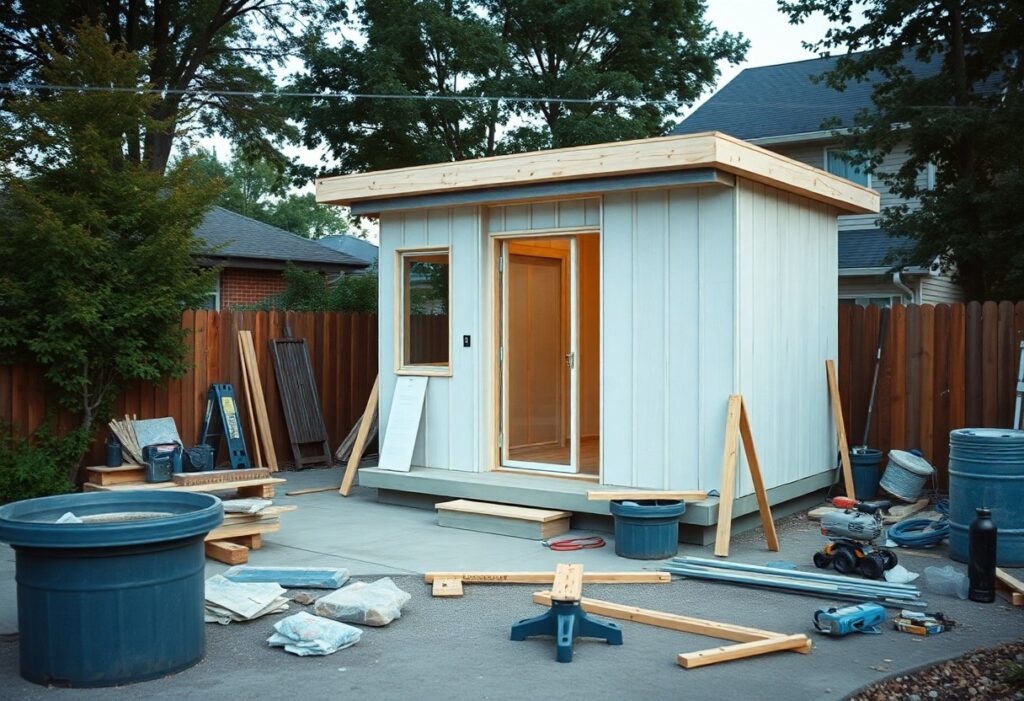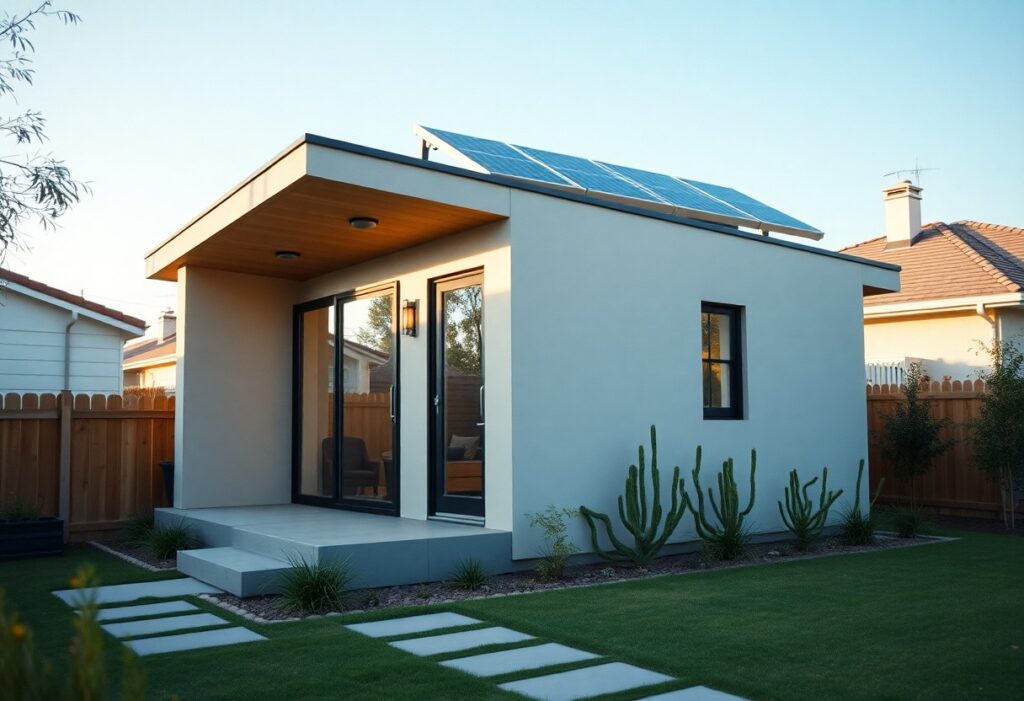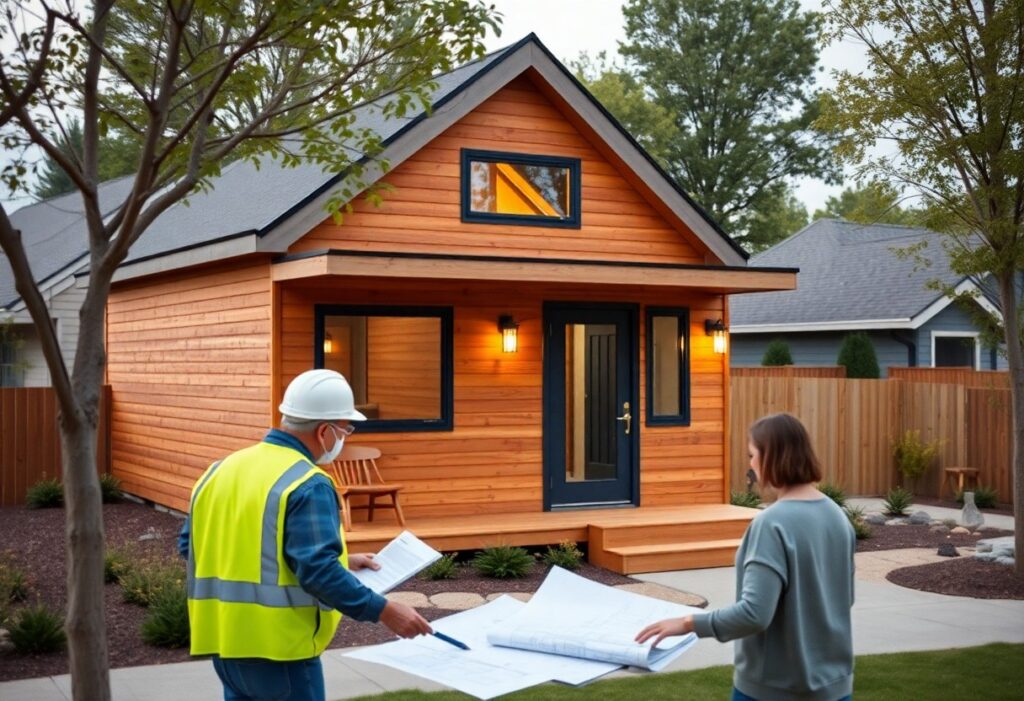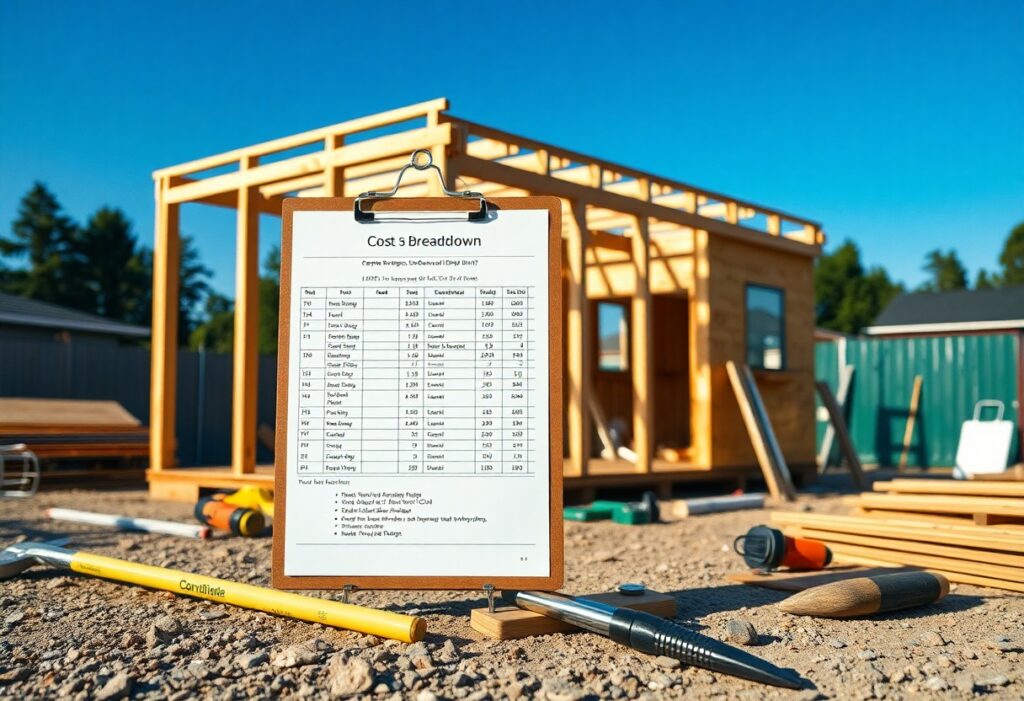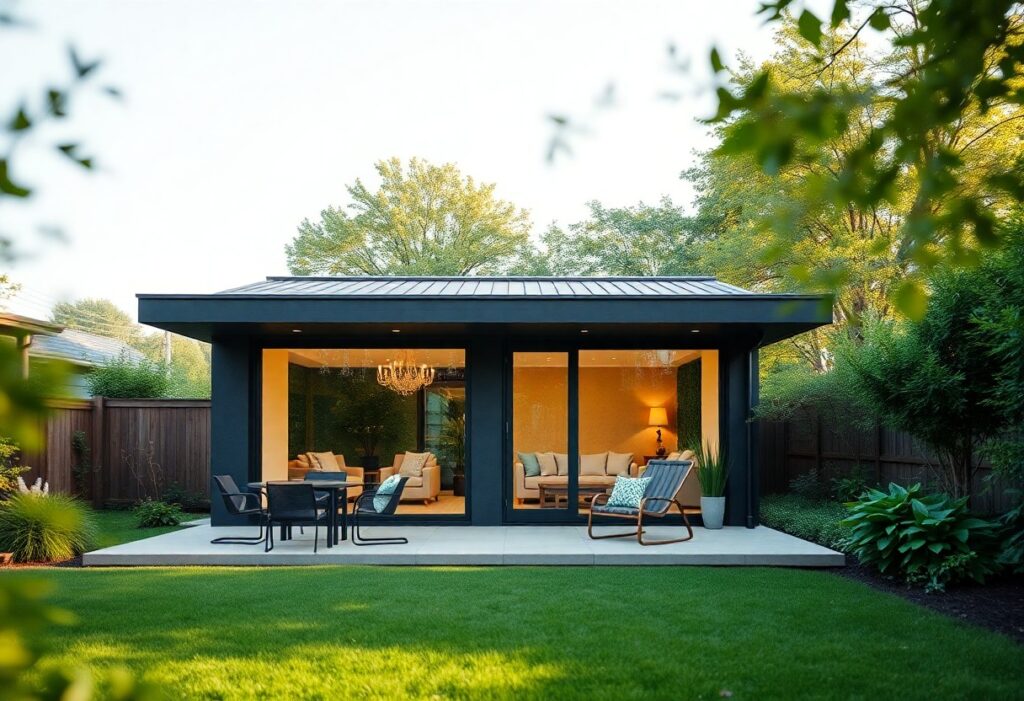Many homeowners like you are exploring the benefits of Accessory Dwelling Units (ADUs), but selecting the right contractor can be a daunting task. With a growing number of ADU builders in the market, it’s vital to conduct thorough research and due diligence to ensure you partner with a reputable and experienced professional. This guide will help you navigate through the selection process, highlighting key factors to consider, so you can confidently choose a contractor who will bring your vision to life while managing your project efficiently and effectively.
Key Takeaways:
- Research Experience: Look for contractors who have significant experience with ADU projects.
- Verify Credentials: Ensure the contractor is licensed and insured to protect yourself and your investment.
- Check References: Ask for and follow up on references from past clients to gauge satisfaction and reliability.
- Evaluate Communication: Choose a contractor who communicates clearly and is responsive to your questions.
- Compare Quotes: Obtain multiple estimates to understand the market rate and ensure a fair price for your project.
1. Research local ADU builders and their reputations.
2. Verify contractor licenses and insurance coverage.
3. Review past projects and client testimonials carefully.
4. Obtain detailed written estimates from multiple contractors.
5. Assess communication style and responsiveness during consultations.
6. Discuss timelines and project management approaches upfront.
Understanding ADUs
For homeowners looking to utilize their property more effectively, Accessory Dwelling Units (ADUs) present a valuable solution. These smaller, secondary housing units can be attached to or separate from your main home, providing flexibility in living arrangements, income potential, and increased property value. Understanding what an ADU is and its various benefits can help you make informed decisions for your project.
What is an ADU?
Among the various housing options, an Accessory Dwelling Unit (ADU) is defined as a self-contained living space that can be located on the same lot as your primary residence or within the home itself. This unit typically includes a bedroom, bathroom, and kitchen, allowing for independent living while maintaining proximity to the main house.
Benefits of Building an ADU
Along with providing additional living space, building an ADU offers numerous advantages that can greatly enhance your property’s appeal and functionality. From generating rental income to creating a private space for family members, ADUs can transform how you utilize your property.
A significant benefit of constructing an ADU is the potential for extra income through rental opportunities, helping you offset your mortgage or other expenses. Moreover, ADUs can increase your property’s overall value, making it more appealing to future buyers. This increased flexibility in utilizing your space allows for accommodating aging parents or providing housing for young adults in the family while maintaining their independence. Ultimately, integrating an ADU into your property can enhance both your lifestyle and your investment.
Finding Potential Contractors
Any homeowner looking to build an ADU should start by identifying potential contractors in their area. Begin by asking for referrals from friends, family, or neighbors who have recently undertaken similar projects. You can also explore local home improvement stores and construction forums where reputable builders may be highlighted. Attending community events or workshops related to housing can provide valuable leads as well.
Researching Local ADU Builders
Below are some effective methods to research local ADU builders. Check online directories, local associations, and review websites to compile a list of contractors specializing in accessory dwelling units. Look for builders who specifically mention ADU construction on their websites, as this indicates expertise in the area.
Utilizing Online Resources and Reviews
The internet offers a wealth of information when it comes to evaluating contractors for your ADU project. Platforms like Yelp, Google Reviews, and Angie’s List allow you to view past clients’ feedback and ratings of potential builders. This can help you gauge their reliability and quality of work before making a commitment.
It’s beneficial to pay close attention to both positive and negative reviews. Focus on the contractors’ response to criticisms and how they handled past projects to assess their professionalism. Look for testimonials that mention timeliness, communication skills, and overall satisfaction with the completed work. Consider investigating builders with a consistent track record of success, as they are more likely to meet your expectations and ensure a smooth construction process.

Qualities of a Good Contractor
Your contractor should possess a blend of crucial qualities that make them reliable and efficient for your ADU project. Look for strong communication skills, attention to detail, and a commitment to meeting deadlines. A good contractor will listen to your ideas while providing expert insights, ensuring that your vision is executed perfectly. Additionally, they should showcase transparency in pricing and an eagerness to maintain a clean and organized worksite, fostering a positive working relationship throughout the project.
Credentials and Certifications
An effective contractor should hold relevant credentials and certifications that demonstrate their expertise in the field. Look for licensed professionals who are bonded and insured, as these factors indicate a level of accountability and assurance for your investment. Participation in industry associations can also reflect a commitment to staying updated with the latest building codes and best practices. This ensures your project aligns with local regulations and standards.
Experience in ADU Projects
Around 70% of successful ADU projects stem from contractors who specialize in this type of work. Hiring a contractor with specific experience in ADUs may significantly impact the project’s success. Good contractors bring a wealth of knowledge about local zoning laws, building permits, and necessary inspections. Their expertise can minimize the risk of costly mistakes and streamline the construction process, which can often be overwhelming for homeowners. Always inquire about their past ADU projects; viewing their portfolio can help you gauge their style, skills, and overall ability to meet your needs.

Interviewing Contractors
Now that you’ve narrowed down your list of potential ADU builders, it’s time to conduct interviews. This is an opportunity for you to assess their qualifications, expertise, and compatibility with your project vision. Ensure you prepare adequately by developing a clear set of criteria to evaluate each contractor you meet. Pay attention to their communication style, responsiveness, and ability to address your concerns. Choosing the right contractor can significantly influence the success of your project.
Questions to Ask
Above all, the questions you pose during the interview process will reveal the contractor’s experience and approach to your project. Inquire about their previous ADU projects, timelines, licensing, and insurance. It’s also beneficial to ask about their preferred subcontractors, conflict resolution strategies, and how they handle project changes. Your questions will help you gauge their expertise and ensure you’re making an informed decision.
Red Flags to Watch For
Behind the scenes, there are red flags that you should be on the lookout for when interviewing ADU builders. If a contractor is unable or unwilling to provide references or past project photos, that’s a sign you should proceed with caution. Additionally, watch for vague answers about pricing or timelines, as these can indicate a lack of experience or transparency.
A big red flag to consider is inconsistent communication. If a contractor doesn’t respond promptly or fails to answer your questions clearly, it may reflect their commitment to the project. Another warning sign includes a reluctance to provide written contracts or estimates—this can lead to unexpected costs later on. Lastly, be wary of contractors who pressure you into making quick decisions; a trusted builder should want you to feel confident and informed about your choices. Your peace of mind is imperative.
Comparing Estimates
Unlike many home improvement projects, building an ADU requires a thorough comparison of estimates from different contractors. This ensures you understand the financial implications of your project while allowing you to weigh options carefully. Below is a breakdown of what to consider:
| Cost Factor | Details |
|---|---|
| Labor Costs | Varies by contractor experience and project complexity. |
| Material Costs | Quality and type of materials can significantly impact the overall budget. |
| Permitting Fees | Local regulations may require fees that can add up. |
Understanding Cost Factors
For a successful ADU project, understanding the various cost factors involved is important. Factors include labor costs, the quality of materials, and necessary permits. By evaluating these components, you can appreciate what goes into your estimate and ensure it aligns with your budget. Any decision should factor in not just costs but also the value each component brings to your project.
Evaluating Proposals
Along with reviewing estimates, evaluating proposals ensures you choose the right contractor for your ADU. You should look for clarity in each proposal, focusing on specifics like project timelines, materials, and payment terms.
Also, ask the contractors to provide detailed breakdowns in their proposals, including material costs, labor responsibilities, and project timelines. Pay attention to any vague language that could lead to unexpected expenses down the road. A proposal that clearly outlines what you will receive and each contractor’s approach is a strong indication that you are working with a reputable builder. This is crucial in avoiding unpleasant surprises during your construction process.
Checking References and Past Work
To ensure you select the right ADU contractor, it is imperative to check references and past work. Speak directly to previous clients and visit completed projects to gauge the quality of the contractor’s work. For more insights, consider exploring What to Consider when Choosing your ADU’s Contractor.
Importance of Due Diligence
To make an informed decision, conducting due diligence is imperative. This involves thoroughly vetting potential contractors and understanding their reputation in the market.
Reviewing Previous Projects
An effective way to assess a contractor’s capabilities is by reviewing previous projects they have completed. Look for consistency in their work and ensure it aligns with your vision.
And when reviewing previous projects, pay attention to the quality of craftsmanship, adherence to deadlines, and client satisfaction. Check if they are experienced with the specific style or type of ADU you want. A contractor’s previous work can reveal their attention to detail and ability to navigate challenges, demonstrating their reliability. Always ask for design elements or building features you plan to include to ensure they can meet your expectations.
Conclusion
Following this guide will help you make informed decisions when selecting the right ADU builder for your project. Evaluate potential contractors based on their experience, credentials, and communication skills to ensure they align with your vision. By conducting thorough interviews and checking references, you can find someone who not only understands your needs but also shares your passion for creating a functional and beautiful space. Choosing the right contractor will ultimately lead to a successful ADU that enhances your property and meets your expectations.
Q: What should I look for in an ADU contractor?
A: When selecting an ADU contractor, consider their experience specifically with accessory dwelling units. Look for credentials, licenses, and insurance to ensure they have the proper qualifications. Additionally, check their portfolio of completed projects to assess the quality of their work and seek reviews or testimonials from previous clients to gain insight into their professionalism and reliability.
Q: How do I verify a contractor’s credentials?
A: To verify a contractor’s credentials, start by checking their licensing status through your state’s licensing board or website. You should also ask for proof of insurance, including general liability and workers’ compensation. This protects you from liability in case of accidents on your property. Furthermore, contacting references provided by the contractor can also help you evaluate their work history.
Q: What questions should I ask during the initial consultation?
A: During the initial consultation, inquire about the contractor’s experience with ADUs, their typical project timeline, and how they handle permits and zoning regulations. Ask about their approach to project management and communication, including how often updates will be provided. Additionally, discuss payment methods, scheduling, and any potential additional costs you might incur, ensuring clarity before commencing the project.
Q: How can I assess the contractor’s project management skills?
A: To assess a contractor’s project management skills, ask about their processes for tracking progress and managing subcontractors. Inquire about their communication style and frequency of updates. A reputable contractor should have a clear system in place for addressing issues that may arise during construction. You can also look into their past projects to see how efficiently they completed work and whether deadlines were met.
Q: What factors might affect the cost of building an ADU?
A: The cost of building an ADU can be influenced by several factors, such as location, design complexity, and materials used. Additionally, zoning laws and permit fees in your area can also contribute to overall expenses. The size of the ADU and any necessary site preparation, such as tree removal or grading, will further impact costs. Always ask for comprehensive estimates before the project begins to avoid unexpected expenses.


